#i love how they're narrating the experience for the viewers too
Explore tagged Tumblr posts
Photo
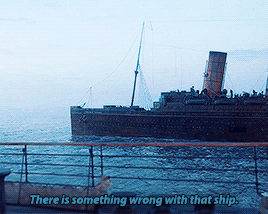
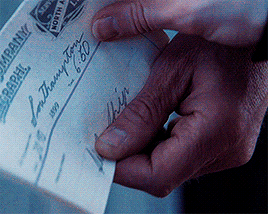
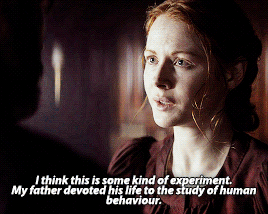
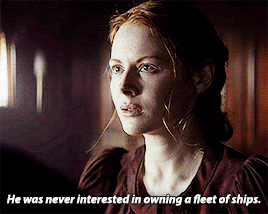
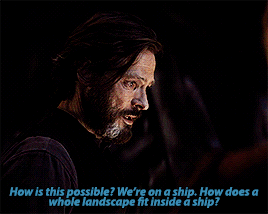
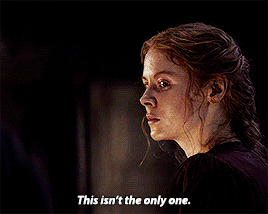
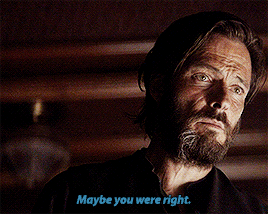
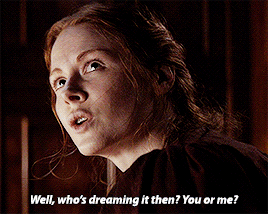
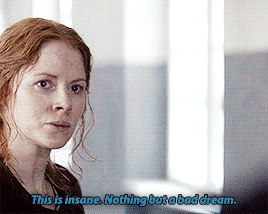
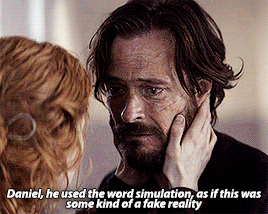
Maura & Eyk — solving the mystery of 1899
#1899#1899edit#1899 netflix#1899 spoilers#eyk larsen#maura franklin#eyk x maura#maura x eyk#i looove them working together on solving this absolute psychological nightmare#so heartwarming seeing two people connect over secretly losing their minds at the same time#i love how they're narrating the experience for the viewers too#from sth wrong with the ship to an experiment to a dream and finally the big reveal - a simulation#brilliant#mine#blogtag: mauraxeyk
266 notes
·
View notes
Text
T*LC Refutation (but decidedly NOT johnlock refutation)
Part - 3 : Everything wrong with their versions of the words "subtext" and "symbolism".
[Note: I love and ship johnlock because I saw it for myself in the show when I watched it and was part of the general audience in the past. I even want it to become canon in some Holmes adaption in the future. But T*lc needs to get sucked into obscurity and forgotten. Other fandoms like Good Omens, etc., are following the same rhetoric in their "meta" posts, and that needs to go. This is crucial for our basic critical thinking skills and objectivity.]
Now, let's discuss about the two things t*lcers talk about the most in their posts: Subtext and Symbolism.
a.) Subtext:
Real definition of subtext: Subtext is implied text in the simplest words. Meaning, something needs to be there in the plain text for the viewer to be led to the subtextual implications of the said plain text.
This means the plain text gets the main priority all the time out of the two.
Fake (t*lc) version of the definition of subtext: An element that tells a brand new story in the background, which only a handful of people in a large audience can pick up on because they're the *experts* and everyone else is a "casual". Plain text is useless and it can burn in the trash. (though only when the plain text doesn't support t*lc).
Read this article on the hierarchy of evidence, and feel free to throw it at anyone who claims to know about something for sure, just because they're the expert in that field, next time. Huge thanks to Kim for sending me this link and discussing the whole thing with me.
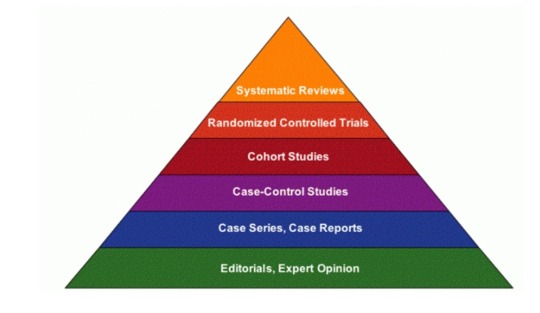
Expert opinion is literally at the bottom. It doesn't count as anything if you want your college paper to get approved.
You should know that much, if you're such an expert. :P
b.) Symbolism:
In the simplest words, symbolism is the idea that things represent other things. It is used in fictional stories all the time to enhance the writing style, and to urge the audience to think deeper.
But here's the thing: "Enhance" is the key word here. You cannot tell an entire story only through symbolisms. Symbolisms and subtext are only used to highlight what's already there in the plain text.
Everyone outside the t*lc echo-chamber knows that the general audience makes up for the majority of the entire audience. Their interpretations about the source material are important. Most people aren't going to keep an eye on every single molecule of their screens on which they watch the show. And writers do need their stories to come across. If they kept narrating everything through only obscure codes and symbolisms, nobody is going to get the story. Their entire efforts would be useless.
Moreover, t*lcers don't seem to understand the difference between symbolisms and allegories, as my brilliant friend Kim pointed out.
The key difference here is that allegories are the ones that tend to have a fixed meaning in the story, when they're meant to represent something abstract.
Symbolisms, on the other hand, tend to be arbitrary in their meanings. Take the colour pink, for example. It used to represent masculinity in the Roman times. Look how the times changed, and it has become the epitome of femininity now!
Here's a more insightful take from How to Read Literature Like a Professor (a book one of the t*lc people themselves rec'ed. Apparently they cherry-picked here too) :

If something such as symbolism is so arbitrary that its meaning changes from time to time, and from person to person (indovidual opinions), do you really think it is reliable to tell an entire story? No.
That's why the literary device "symbolism" is just used to enhance what the general audience can already see in the plain text.
Most of the symbolisms these people come up with in their meta posts are not even real. They just experience patternicity and think they've figured everything out. They really haven't. And in the name of sources, they just say, "Read my meta!", or "Here, read my friend's meta," or provide any other incredibly unreliable and cherry-picked links.
Why would anyone read your meta when it's clear what you wrote is obviously coming from some sort of bias? You guys are not even consistent in your theories half of the time.
You don't even know the difference between symbolisms and allegories, or even the true meaning of subtext, given how much you keep claiming to be experts in literature and cinema.
Pulling claims out of thin air that BBC Sherlock is a slow-burn romance because the BBC station asked Moffat and Gatiss to do that, etc., doesn't help anything.
Mind you, I would've made this post even if johnlock had become canon in BBC Sherlock. A logical fallacy is still a logical fallacy, even though someone might come to the correct conclusion through it accidentally.
That's why most of the t*lc style meta posts feel weird and off-putting, even though they might look clever on the surface, because they usually tend to use a lot of fancy words.
Part-2: What's wrong with their actual meta posts?
Parts- 4 and 5: Harmful aspects of T*LC (4) and Conclusion (5).
T*LC refutation (but NOT johnlock refutation) master post.
#anti tjlc#anti mofftiss#anti moffat#anti bbc sherlock#sherlock holmes#we care about science and sherlock holmes in general#subtext#symbolism#literature#fandom meta
5 notes
·
View notes
Text
My Week(s) in Reviews: October 21, 2023
It's been a while... Here's what I've been watching.
The Wonderful Story of Henry Sugar (Wes Anderson, 2023) The Swan (Wes Anderson, 2023) The Rat Catcher (Wes Anderson, 2023) Poison (Wes Anderson, 2023)

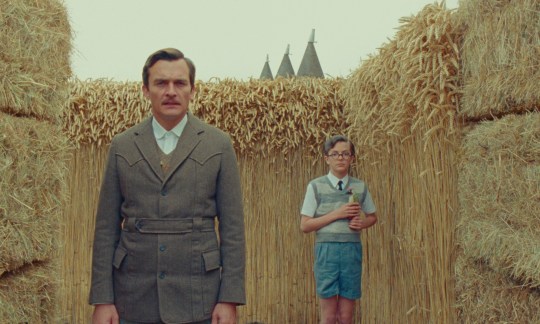


I dropped the ball and didn't get around to reading Roald Dahl's stories before watching these, but it was hard enough waiting for all four to release on Netflix, so I definitely wouldn't be able to wait to get my hands on the stories. From my understanding of the source material, though, these are all perfectly peculiar adaptations, staying true to Dahl's voice and heart. All four short films shine unique light on Wes Anderson's strengths as a filmmaker and storyteller, and it was a pleasure to witness. The Rat Catcher is very likely my favorite of the bunch, with a bizarre story and characters, including an award-worthy turn by the always fantastic Ralph Fiennes. Second best would easily be The Wonderful Story of Henry Sugar, which highlights Anderson's knack for idiosyncratic storytelling, grabbing hold of the viewer and honoring the source material by keeping it intact. Poison was an experiment in suspense, and both Anderson and the cast delivered completely. I definitely wouldn't mind seeing him venture into more tense material in the future. And, despite the jaw-dropping performance from Rupert Friend, The Swan was probably my least favorite, over-utilizing its narrator storytelling to the point where I felt detached from the story. There's just so much to love throughout the four of these shorts, though. Unsurprisingly, the production design in all four is brilliant, and I especially loved how interactive Anderson & Co. got with it all, here. The stagehands and creative handling of props stoked the imagination. Robert D. Yeoman's (and even Roman Coppola's) cinematography was singularly stunning. And the cast was pure perfection. The aforementioned stand-outs are only the beginning; everyone here was working at the top of their game. I know they're shorts, but don't be surprised if you see Fiennes and Friend - as well as Dev Patel and Ben Kingsley - popping up in My Best of 2023 lists. I really wish I could've experienced these in a cinema, but when it comes to Wes Anderson, I'll take whatever I can get, whenever and however I can get it. The Wonderful Story of Henry Sugar: 9/10 The Swan: 7.5/10 The Rat Catcher: 8.5/10 Poison: 8/10
Totally Killer (Nahnatchka Khan, 2023)

The overreactions to the way the teens in the '80s behaved got annoying real fast and shone a horribly unflattering light on just how disinterested people of her character's generation are with taking context into consideration when spouting their attention-hungry pontifications. Then again, that's probably the point? So, good job? The cast was okay. The kills were dull. The horror wasn't scary. The comedy wasn't all that funny. The writing in general is lazily paper-thin, and the stakes damn-near nonexistent. - 3/10
The Creator (Gareth Edwards, 2023)

I gets some extra points for being an 'original' sci-fi film in a landscape of sequels, reboots and additions to the MCU, but sadly those wind up being pretty much the only points it ends up with. Despite being 'original', every single aspect of this film feels like a tired rendition of a significantly better film. And worst of all, it's all just completely forgettable... I literally forgot Allison Janney until checking IMDb, just now. Sturgill Simpson was a standout, though. I look forward to seeing him again in Killers of the Flower Moon, this week. - 4/10
Fear Street: Part One - 1994 (Leigh Janiak, 2021) Fear Street: Part Two - 1978 (Leigh Janiak, 2021) Fear Street: Part Three - 1666 (Leigh Janiak, 2021)
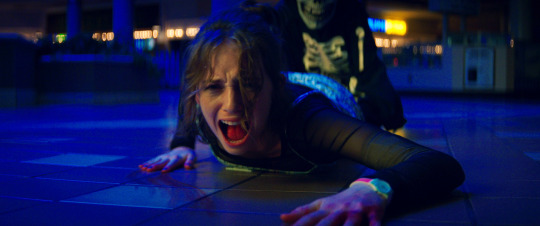


They function a little too much as more a limited series than even a trilogy, so they lose some points for that. However, all three are quite good. The best is the first, of course, working the most as a standalone. It also has the best kills and characters, and a tone that most successfully mines the scares out of the material. The second has a good setting, but the extremes of the characters detract from the tone. And while the third works best in its back half, when it completes the storyline set up in the first film, the 1666 section is enjoyable enough in its depiction of just how absurd the 1600s puritan belief system was. 1994: 8.5/10 1978: 7/10 1666: 7.5/10
Enjoy!
-Timothy Patrick Boyer.
#film#the creator#the wonderful story of henry sugar#fear street 1666#fear street 1978#fear street 1994#fear street trilogy#movies#my week in reviews#movie#cinema#film review#movie reviews#wes anderson#horror movies#etc.
8 notes
·
View notes
Text
Some Ted Lasso finale thoughts
I feel like I always have to preface my Ted Lasso opinions with the reminder that I haven't seen the series in full, but! I have watched all of s3, parts of s2, and the first few eps of s1. I realize I'm working with limited context though.
I think my fave character overall was Trent. His physical comedy was outstanding, plus I just love that his role this season was basically: fly on the wall/reaction shot. I feel pretty cheated we didn't get some meaningful voiceover from him, though. You know, a bit of narration of his book. Feels like something like that would've tied in nicely within the montage.
I feel bad for the shippers (those first few minutes were especially cruel to the Ted/Rebecca shippers) but I also feel like a lot of the reactions I've seen in the tags would be way less critical if the shipper goggles weren't fastened so tightly. There's something to be said about online fandom and getting caught up in the echo chamber of it, and how that sorta amplifies your confirmation bias. You look for the things you want to find, even when they're not textually there. Before the finale aired, I kept seeing people be SO SURE that Rebecca would go to Kansas with Ted and for the life of me I couldn't understand WHY. Those two characters, in the context of tumblr? You see enough "invisible string" gifsets paralleling some of their scenes, sure. Maybe those two versions of Ted and Rebecca end up together, but the actual characters on the show? Who barely spent time together outside of work? Who thought of each other so, so platonically? I don't get it. If I have to like, deep dive into symbolism and read into stares and decode their supposed body language and break out the tack board to connect the dots because of some color scheme of the clothes they wear, with nothing actually happening onscreen telling me these people care even a little bit romantically about each other? Surely that says something about canon. If I, a casual viewer who isn't mainlining gaze-count compilations or whatever, aren't seeing what the hyperfocused fanbase is seeing onscreen with my own eyeballs, doesn't that imply some of the interpretation is fanon and not canon? Just a little? Obviously that is just the universal shipping experience, I'm not trying to be condescending or judgmental, I'm just saying: be for real. BE FOR REAL, Y'ALL.
I liked seeing Rebecca's emotions for Ted spill over in all of their scenes together (semi-related: I feel like when Rebecca was grieving Ted so hard and he was... not giving the same energy back it's because their headspaces were so different in those moments: for Rebecca, it was about saying goodbye. For Ted, it was about saying hello... to his family. Rebecca was feeling loss, and Ted was too, but he was also gaining back something big. But anyway!!) I do wish they hadn't pulled the "you go, I go" trope. For so long, so much of Rebecca's arc was about her getting back her independence from Rupert. Why, at the last moment, try and anchor her to another man? Especially after that episode where she stood up against all those old rich dudes and reminded them why they love the game, why the fans love the game, why SHE loves the game? It felt weird. If it was a panicked reaction because she was losing a really good friend, then I wish the show would've had Ted, ya know, COMMUNICATE with her instead of staying so mute, to remind her that she loves what she does, that she's earned her place, and that she can do it alone. But she wouldn't even be alone! She has literally everyone else she's always had in her corner still in her corner.
If I had been super into either Roy/Keeley or Jamie/Keeley I would be SO BUMMED that the show pulled the last second third wheel card, just to give them an ambiguous "Keeley chooses neither" ending. But I can also appreciate that the show just threw its metaphorical hands in the air and refused to make a choice. I, too, see the appeal of all sides of the triangle and don't even know what my preference would be. Besides throuple, obviously, which I also think the open-ending left a little crumb trail to set up. I will say, overall, Roy was so reactive this season in his feelings for Keeley. He broke up with her, then really only started gravitating back to her when she was with Jack, or when he was jealous about the leaked video, or jealous about Jamie. That wasn't my favorite, but he also just pines really nicely so I get the otp of it all.
All of the "Ted is leaving all his friends behind! He's got nothing to live for in Kansas except his son!" online takes are SO BAFFLING. Y'all realize this character didn't apparate from the ether into Richmond as a fully grown, fully mustached man, right? He came from a place where he ALSO had friends and family he was leaving behind, with relationships that were likely just as important to him. And he will make friends after. Like????? You'd think Ted was returning to the gallows on a death sentence or something, just to wither away after Henry grows up.
I think I'll try and watch the show from the start and see if my opinions on anything change. I've heard that all of the prime Ted/Rebecca stuff happens early on in s1, and maybe seeing them in a classic enemies-to-friends situation might reveal to me what the shippers see. And maybe I'll care more about Nate's arc and Jamie's growth.
ps; dollsome, if you're reading this and you've made it this far, look away!!! Because, I'm sorry, I love that the Dutch boat guy came back. His and Rebecca's chemistry was just off-the-chart bananas. I think the psychic stuff was set up to red herring the crap out of the fandom from all sides, I don't think Rebecca and boat guy are like, psychically fated and meant to be, but! They were lovely, so I'm glad their montaged future had them together. And with a pilot in her life, hey. Rebecca can fly out to Kansas and visit her old bud, Ted, anytime, right?
5 notes
·
View notes
Text
I think it's Eddie, and I think it's deliberate. The main characters are consistently framed as narrators throughout the show - and more importantly, they're often unreliable or downright lying.
Take Kim. She's very clearly not Shannon, and she never was. She looks and acts entirely different. Hell, I didn't realize Kim was played by Devin initially, and I know that holds true for more people. So Eddie sees a resemblance, but he focuses only on her face. It's... beyond superficial. It is looking for something not really there - the show made Kim not look or act like Shannon.
Then, the show messes with our brains when they show Eddie's post-sex flashback to Shannon, and I think they specifically chose that to first make the viewer believe he is cheating on Marisol, only to reveal he isn't... but considering this is a memory, why not focus on the things he loved about Shannon? Because he can articulate them, we know that from the cut scene, but they're talking about Christopher, and again her being Christopher's mom before anything else. (Speaking of which, the show does the same thing when we expect Kim to show up at Eddie's place but it's actually Buck showing up... Kim creating an opening for both Shannon and Buck, hmmm).
Returning to the significance of the lake in the cut scene... Eddie's going by memory here, but if that memory was so significant, why didn't we see that as a flashback? I think it's because he's meant to be unreliable. Even more so because of the whole first girl he did/didn't date situation (sidenote: I think the "first girl you dated/slept with" conversation served to draw more attention to how Shannon really was Eddie's first serious relationship), and Eddie lying about plenty of shit to plenty of people throughout S7 (I think there's a deliberate paralel between Eddie and Bobby here, both stuck in the past).
Don't get me wrong, I think 7x09 is fucking weird. It's irritating and weird and honestly the heart to heart he has with Kim makes me cringe (and I'm glad to know Ryan hated it too lol). Taking just those scenes makes it seem like it's the show romanticizing Eddie and Shannon, except Eddie proceeds to blow up his entire fucking life over the Situation when he's acknowledged (to Buck) that he actually doesn't know what he wants. He doesn't even know himself whether he wants Shannon back - I think that's because even he is aware, to some extent, how much he has romanticized his memory of her.
So yeah personally I think it's Eddie, and I think the show was going for something else in the Vertigo plot but failed so spectacularly that it almost comes off that way... when actually the show wanted to use Eddie's memory of Shannon as a plot device/a basis for some psychological horror... because above all else, Tim is captain of the Eddie whump ship, not of the Eddie having a wholesome experience for once, lol.
The way I can't tell if it's eddie or the show that is romanticizing Shannon and eddie relationship
30 notes
·
View notes
Text
Ethics and morality... and how they're not the same...
Weird title, and I don't even know if I'll properly approach this one with all the topics I wish to this discuss in today's The Devil Judge essay, because a lot of things peaked my interest, I was debating on doing a separate post for each subject, but I'll do them all in here:
Starting simple
I know we're only 4 episodes in, but I want to break down the things that I often look for in a new show:
Cinematography
Soundtrack
Character building
Plot devices
Social commentary (sometimes)
Of course, these are things most people would consider basics, but I find that a lot of TV shows don't have enough balance in them. Also, cinematography and soundtrack are pretty up there for me because when a plot gets slow, or something like that, I stay for those two (biggest example: King Eternal Monarch).
The soundtrack in The Devil Judge is amazing and the cinematography can be a character of its own. They really get me hooked and are used as tools to properly tell a story. And I'll get into that further down this post.
The onlooker will never understand the actor
Experience is your best friend not only applies to job hunting, but it's true in the real world too. You can't truly weigh in on something unless you've experienced it yourself, you can give it your judgment and everything, but when bad things happen to someone, you'll never truly understand their pain. Am I bringing up because of the difference of mind in Judge Kang and Judge Kim's opinions? On how the public treated the minister's son? No. I'm talking about a very specific scene, where the cinematography told me to think that way and not the dialogue (it's that easy for my mind to be swayed). In episode 3, when the rich are about to dine right after the foundation's commercial for a better future, we see this aerial shot:
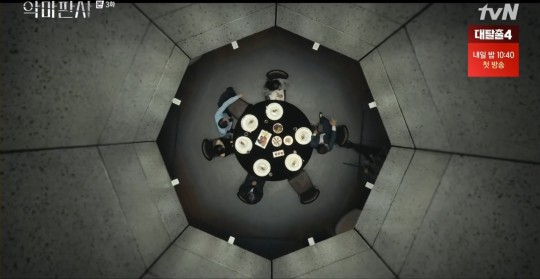
What's interesting about this? The seclusion and the enclosed feeling it conveys as a counterpart to the poverty shots we were just shown. Yet, these are the people making ads for a better future, what do they know?
They live comfortably behind concrete walls with no windows to see what goes on apart from the bubble they live in. This idea is further enforced at the party in episode 4, where they're not even a part of the donations, and watch and mock from afar as spectators. Yet, these people call the shots. They even call it commenting, as if they were watching the pain of others on TV.
The intriguing personality and the duality it encites
Now, this was a costume and wardrobe decision, but it was also very well thought of:
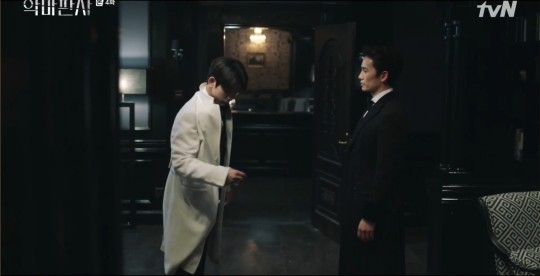
Judge Kim wears white and Judge Kang wears black. One is morally perceived by viewers of the show as morally good and the other is perceived as morally dubious at best. However, besides the costume and wardrobe thought put into this, we also have to think about the delivery of this scene and how it may further affect my detailing of this section. Judge Kang brings down the coats, and hangs over the coat to Judge Kim, he's the one who is making that annotation: You're pure, I'm tainted. This can have one of two interpretations:
Either Judge Kang believes Judge Kim to be pure and innocent due to his status as a rookie in the field
Or he believes Judge Kim to be morally white and himself morally black as he's looking at his brother's face and not at Judge Kim's heart.
Because most of the back story we're unveiling is through Judge Kim's perception, there's also an inherit bias we're having as well, because in Judge Kim narrative, he believes he's doing what's right and believes Judge Kang to be evil. In being served information about Judge Kang through Judge Kim's eyes, our bias is inherently skewed.
Another thing is that, when they put on the coat, they're standing in front of the other, as if the producers of this series are telling us they're two sides of the same coin.
The duality is made in more deceitful ways, which include:
A difference of classes that implies one has suffered while the other has not.
A difference of experience that implies one is more tainted while the other is pure.
A difference of age that implies one is a sly fox while the other one is is bunny about to be eaten.
A difference of temper that makes one erratic and the other logical.
Power dynamics
This one, in this one I could make a whole thesis based on just a couple of scenes in the drama. And you know I have to mention it: director Jung being the puppeteer.
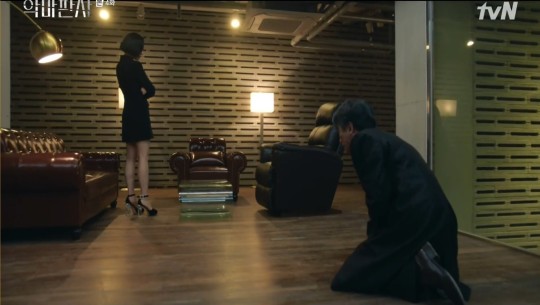
It may not be as unexpected at first, nevertheless it brings forward a lot of things I've wished to touch upon for quite some time now. A woman being a puppeteer of an old man in the portrayed dystopia that The Devil Judge is painting makes much more sense than more common demonstrations of these dynamics where it's either a:
A man of power being controlled by a bigger man of power.
A man of power being controlled by a seemingly man of a lower status.
A woman being controlled by a man of power.
Although, there's nothing wrong with those power dynamics, and if they were to be used, a message could also be conveyed, this one in particular works as a megaphone.
A subversion of power in such a way can be interpreted as a true indication of the weak overcoming the powerful. Why? It is not that woman are naturally weaker than men, but that in society, patriarchy has been a big factor in taking voice away from women in order to give it to men.
In order for Director Jung to achieve her purposes, it's smarter for her to do it under the pretense that an old rich man in power is the one calling the shots.
This is better exemplified by her stance when the old man tries to excuse his behavior, and what her moral compass is. I'm not saying I agree with her unethical conduct, but that her morality is directly impacted by the perception of the public of her as a weak woman:
Just because a dog bites a human does the person get dirty?
This is telling on how she perceives the actions of the old man in gropping the waitress. She didn't do anything wrong, even if you touched her, you are the dirty one.
While she's evil, it's a refreshing and deep evil.
The public's opinion and how there's actually logic in the show's portrayal
The public opinion can make or break a person, even if it's not on a public trial like this. While "cancel culture" barely works in today's society, a person's reputation is forever tainted. The show does tell that, but it also exhibits the scary downside of it, by showing how easily it was to make people accept flaggelation as a fitting punishment.
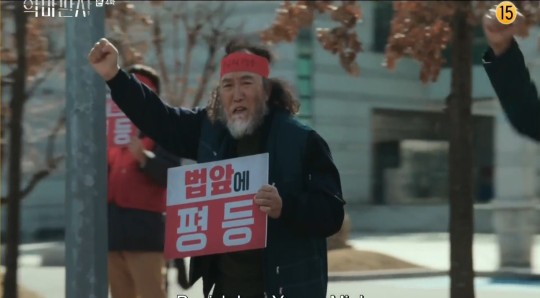
There are many experiments that have tried to test the effect of societal pressure on an individual's decision and the effect of the authority's enforcement of power in the outcome of these decisions. Furthermore, theories based on analysis of human behavior not necessarily relying on experiments can also help break this down. What do I mean? Here's a small attempt at explaining:
Milgram Experiment on Authority: which measured the individual willingness to carry out actions that go against their conscience due to an authority's approval.
Argument from Authority; The idea that people are more likely to use an authority's opinion on something as an argument for their reason. This is often seen in science, where trusted authorities have done the research and offer it to the public. In here, authority bias also plays a role, as we often believe, at first, that an authority must be right.
Moral disengagement: basically speaking, because this is evil or bad, I'm not part of it and I most probably am not actively participating in it. One may disengage by moral justification, which means that before engaging in something that has been previously perceived as immoral, I'm changing my stance on it based on what I tell myself to be logical arguments. This particular form of moral disengagement is very effective in changing the public opinion. I'll be touching on another form further down this post.
Other factors played a part, but these ones in particular came to mind when public flagelation as a form of corporeal punishment was wildly accepted. First, an authority is the one telling them it's correct, to go ahead. Secondly, another authority (the minister) had previously shown approval to such unusual punishment. Thirdly, they are not the ones to be engaging directly in the act, and even if they were, it would be acceptable because an authority has told them so. They may even believe the punishment to be a necessary evil for the greater good.
In fact, the minister's son was actually correct when pleading his case, they were accepting it because it wouldn't affect them directly.
Regarding the cinematographic descent of the public opinion regarding the situation can better be exemplified by the old man we've seen through the episodes.
Does suffering justify misdeeds?
Today I came along the difference between excuse and reason. You may give a reason for your behavior, but it doesn't excuse it.
Not because I've suffered through shit, means I have to make you suffer too.
I may explain myself, but it's on the other side to excuse me.
Why I hate the unreliable narrator and why I love it so much
This story has been told mostly through the eyes of Judge Kim and what he hears and sees regarding Judge Kang, if anything, the narrative is very close to that of the narrative we've seen in The Great Gatsby. An enigmatic man is being narrated to us from the eye of a man who hasn't known him for a long time.
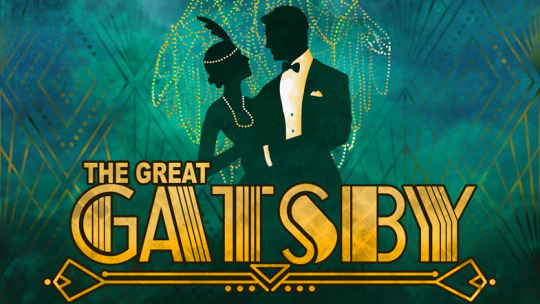
How is that an unreliable narrator? The narrator has their own set of bias and moral standards which function as lenses through which they see the world.
Another way of putting it would be the way teenage romances are often written in a first person narrative where either of the two teenagers is the narrator, so the author can sell to us something as simple as offering a pack of gum as the most romantic act on earth. We're perceiving interactions through rose tainted glasses.
In this case, we're seeing the interactions through Judge Kim's eyes who doesn't trust Judge Kang from the get go due to his own preset bias.
The narrative becomes even more unreliable as we're not exactly sure if what Judge Kang disclosed himself is a fact.
The reason why I love this narrative is because it leaves a lot of space to make simple plot twists to a narrative and make them seem grand, and can elongate a story without making it obvious.
The reason why I hate it is because sometimes, in tv shows mostly, we as viewers can see the other side of the story and grow increasingly frustrated with the main character's prejudice and misunderstandings (I'm looking at you my beloved Beyond Evil).
Also, because I have to wait for a long time before I actually have a clear picture of it.
#kdrama#kdramas#kdrama recommendations#analysis#rant#the devil judge#got7#park jinyoung#ji sung#kdrama meta#kdrama quotes#kdrama analysis#meta#the great gatsby#kim min jung#please dont let this flop
98 notes
·
View notes
Note
(1/6)This is a rant but i need help for mental wellness sorry :p Do you think mavis's character has been an utter disappointment especially during the alvarez arc. I didn't see her do anything to live upto the image of a superior individual with hell a lot of visdom, high moral sense and experience that she's been given being the founder of FT. On one hand she thinks guildmates are soldiers supposed to put their lives on line(i get that since it's a war but just in contrast to makarov)
(2/6) But when it comes to zeref, isnt she too kind. I know she's doing them all a favor by killing him but it doesn't look anything like a punishment. In Her last conversation with him while dying, its like she has nothing to tell him off( except for that chest punching, and calling him out for killing makarov. Damn that didn't look serious at all.)The two of them are celebrating that moment in which he finally gets what he wanted and see absolutely no need for redemption . Just sweet talk.
3/6 have nothing against their love and she doesn't have to stop loving him for being just. Its the complication in this relationship that attracted viewers but in the end it just wasn't all that complicated to be resolved coz she forgets and forgives after a few punches and a kiss ! And even if its a rare situation , we still have Jerza as a better example for how she could have said or done different things at the end. Ezra loves him too but she never once kept her feelings above what's right
4/6 and just. Erza does stop Jellal from killing himself because she loves him but she also makes him realize that to redeem himself he needs to live and earn his own forgiveness. That's what love should do -make you a better person. She isn't soft on him and tells the bitter truths he needs to hear. This is called development.
And Mavis being so wise should've done her part like that even better. But she's so in love and so kind that it makes her forgive and forget everything he's done. Not one sentence that throws light on his atrocities. Not one word of contempt. No complaints. She doesn't even try to make him realize he's been wrong and selfish and even his curse can't excuse that. They're both convinced that its all over
6/6 They're both convinced that its all over and he needs no introspection. I can't just pretend that zeref deserves this happy ending and i cant have respect for Mavis after that. While she was narrating to the guild her story, She was afraid people would shame her for being in love with zeref. I think if there's anything she should feel guilty about then its not that but what she said and implied in this god forsaken Alvarez Arc. What do you think ?
Hey I'm sorry i sent a 6 part question but its all messy. Its my first time here. So some parts are public and mistakenly some are anonymous. God I'm sorry:( . I really liked you blog. Please tell me if you see my question. Its on FT. Love and appreciation....!!!
It’s cool!! I left you anonymous bc I wasn’t sure what you’d prefer, let me know if you’d like me to attach your name to this ask :)
Tbh you’ve hit the nail on the head with a lot of the issues I have with Zervis, which is that despite the fact the relationship is unhealthy, that’s just... not addressed. Zeref does literally anything and Mavis still drops everything to save him and ascend, which... okay, anticlimactic for one, holy shit does he get off easy for two, and really, REALLY unsatisfying for three?
I’m down with unhealthy relationships in fiction as they can be endlessly fascinating, but everything about the way Zervis is handled just confuses Zeref’s character and tanks Mavis’ to the point I’m not sure what I’m supposed to take away from it. What I’m getting is just “unhealthy codependence stuck in an eternal loop” which, fine, that can be interesting, but their Twisted Romance comes at the literal cost of Zeref’s character and what little credibility Mavis still had. It also lacks a satisfying resolution and isn’t exactly what the series was setting up for Zeref.
It’s no secret I’m not a fan of Alvarez Zeref - I feel he doesn’t jive with any of Zeref’s prior characterisation or anything that’s been built up about him over the course of the entire series, and it’s really not fun getting hyped for any of his established plot threads and having them swept under the rug by someone that... really had nothing to do with it? Kinda showed up at the last second?
We spent all that time building up Jellal’s goals, Zeref’s sins, Natsu’s past and Zeref’s connection to Acnologia and for... what, exactly? To not pay off on any of it?
Mavis as a smart, logical tactician was always a bad joke so i’m less annoyed about her, but Zeref... man. He isn’t defeated, he isn’t redeemed, he just kinda peaces out with no consequences or self reflection and Acnologia takes the stage. Cool, I guess? What, narratively or thematically, does this accomplish?
“Love forgives all sins especially the really bad ones?” “Mavis needs a therapist?” “Zeref is a karma houdini?”
UGH anyway I’m not into Fairy Tail anymore despite the name, but it turns out I still had some Thoughts about Zeref so how ‘bout that!
#replies#zeref is just an endlessly confused character i'm not sure how to feel about him#tumblr refuses to put this under a readmore so cool i guess#alvarez arc#zeref dragneel#mavis vermillion#Anonymous
13 notes
·
View notes
Text
There's No End - Mattius Evangelista







2022
This is a documentary about an American musician, Phil Elverum, who moved to the San Juan islands to raise his daughter, Agathe.
The setting is a mixture of the past and the present, we see old images shown throughout the film telling Phil's life story, but mainly we are in the present and his current life with him and his daughter. We are made aware of the geography as we see titles of the location they're in during the film and there are many shots of the woods and environment they're surrounded by.
The main structure of the film is guided by the narration from Phil, his life story leading up to him raising his daughter on the islands. The story is linear and has some flashback elements.
The conflict/tension of the film is the story of how Phil became a single parent and how he lost her Mum to cancer, told through narration and we see how he heals through raising their daughter in their beautiful home on the islands.
Phil is characterised through the narration, we can tell he is a very gentle person in the way he speaks but also a very fun person through the story of his life in the band and we can tell he's passionate about his music in the shots of him playing guitar and drums. His interactions with his daughter that we see are also very gentle and playful, very precious. Agathe is his daughter, we can tell from the film she is a very playful kid who loves being outside and playing with her Dad and her cat. She seems very happy, a lot of the shots we see she's playing or talking and giggling with her Dad at their home, clearly a space she's comfortable in.
The story is told through an off-screen narrator (Phil), and it is told from his point of view.
The soundtrack has some music, most of it is very peaceful and serene like the environment they're living in. The narration is the main point of sound, but we also get other sounds like conversations between Phil and Agathe, the river and the trees, birds, Agathe playing. All of these enhance the atmosphere they're living in and has given viewers a real look into the environment and if you close your eyes you can picture the river trickling or the birds chirping in the trees.
There is a big range of shots used in this film. Lots of close-ups of Phil and Agathe, medium and full shots of their home to show their space, and long shots of the trees and the mountains to establish the area. There are quite a few low angle shots looking up at the subjects showing what they're doing etc.
The lighting switches in this film. When Phil talks about his past in music I found it to be quite cold in comparison to the very warm shots of the present with him and Agathe where the sun streams into their home. The most dominant colours in this film are yellow/orange, very sunset vibes, very comforting and warm. I think there was a filter used on the shots of the beach and the ferry etc, making it look like film - it adds a very nostalgic touch as it's very grainy and has light leaks like film does.
As a whole, I think this documentary was beautiful. Its shots are simple, yet the story is so complex and deep. The imagery is stunning, so peaceful and calm which really allows viewers to experience what their life is like on the islands. It also allows you to not get too distracted by the imagery that you still pay attention to the narration and the real story. It's a really nice telling of Phil's life.
0 notes
Note
Oh, okay! I mostly wanted to hear what you thought of the Connor scenes (in PO) since they're so vital to his arc in s4. And I agree with you on Beauty and the Beasts, the way abuse victims are treated in the Buffyverse is so genuinely appalling, it's undescribable. Disrespecting them so awfully is one thing, but continuing to shove the actual abuse under the rug and show the abusers in a positive light is so gross and gives such harmful messages. Anyways - how about Redefinition? Or Lullaby?
Sorry I couldn’t offer any Connor meta re Peace Out, but I’ve written you some nice, long meta for both Redefinition and Lullaby, so hopefully this makes up for it!
Redefinition
ShortOpinion: Asomewhat erratic, but ultimately satisfying ep
LongOpinion: Redefinitionis really the final episode in the initial Darla arc (when Darla resurfaceslater, it is to set up her next arc on the show, with little to do with thisinitial storyline). I find this episode to be a bit all over the place, as itmoves between Angel preparing to take out Darla and Drusilla, to Wes, Gunn and Cordydrinking and singing at Caritas, to Darla and Drusilla’s plans for power andterror. The transitions between scenes are not as smooth as they could be, andthe episode doesn’t really feel that cohesive, instead coming across as threestorylines presented separately, with nothing really sewing them together untilthe end of the ep. That being said, the three storylines presented make forvery interesting viewing.
Angel continues down his path ofdarkness, his narration essentially confirming that he is going dark in orderto kill Darla, because he’s currently too close to her. He’s smelled her scent,felt her heartbeat, witnessed her with a soul, and now the only way he canmurder her is to access the darker parts of his personality, to cut himself offfrom all humanity so that he doesn’t feel the guilt and loss associated withkilling someone whom he loves.
What’s more interesting thanAngel’s plot and motivations is Darla’s storyline and the motivationsbehind it. After devouring the W&H lawyers, Darla and Drusilla pay a visitto Lindsey and Lilah at their offices, in a darkly amusing scene. They informLindsey and Lilah that the two of them have been spared so that Darla and Druhave a liaison to the Senior Partners, a access-window to the senior partners.Darla has obviously chosen Lindsey due to his easily-manipulated feelings forher, and my personal theory is that Lilah was Drusilla’s pick (Drusillaoutright states that she “likes the girl” because “she’s wicked”).
What’s interesting is Darla (andby extension Drusilla) pursuing this kind of power. Darla, much likeAngelus, has always been presented as an agent of chaos, even under theMaster’s rule. She has never much cared for organised or structured power,preferring instead to indulge in murder, blood, mayhem and terror on anuncharted scale, never much caring for ultimate power. My theory is thatDarla’s pursuit of power is once again tied to her being human so recently, notto mention W&H’s manipulations of her (again, this is seemingly confirmedwith Darla’s speech to Lilah and Lindsey about loathing being W&H’spuppet). But more than W&H using her, Darla hated being helpless full stop.Having memories of being so recently human, remembering the feeling of havingto rely on others, of being dependent and weak (physically and emotionally) iswhat pushes Darla in this new pursuit of power. Just as she tries to ridherself of the remnants of emotion she has left towards Angel, Darla is alsotrying to rid herself of any and all perceived weakness, making sure thateveryone in her way knows that she is no longer that same helpless creature whoneeded Angel to rescue her.
That being said, it is clearlyshown that Angel is still on her mind and in her heart, more so than henormally would be, again because she has so recently been human. Darla was avampire for four hundred years, she pretty much forgot what it was liketo be human, to have a soul, to be vulnerable and to care for someonewith real, true, deep emotions. Now, being a newly born vampire so close tothese emotions, completely throws her off her game. She can remember caring forAngel in a way she never did without a soul. The remnants of her feelings forhim are still within her being, and when he appears in the crowd and Drusillasenses him, Darla’s feelings for him come rushing to the surface, and sheclearly falters, confused and disoriented by the leftover emotions from hersoul.
The climax of this episode feelslike it was supposed to set up a new storyline, but didn’t. Angel sets Darlaand Drusilla on fire (in a fairly horrifying scene, Drusilla’s cries for helpare particularly jarring) and as Darla sits on the sidewalk in the aftermath,she says “That wasn’t Angelus. That wasn’t Angel either. Who was that?” whichto me indicated that maybe the writers were intending to explore this darknessto Angel further than they did, but abandoned that storyline in favour ofsending Angel after W&H.
The B storyline to this episodedoesn’t quite mesh well with the A storyline, but does provide most of thehumour, as well as a turning point for the other three main characters. Despondentand unsure of their futures in the wake of Angel firing them, Cordy, Wes andGunn find themselves at Caritas, searching for direction. Cordy and Wes’ appearanceat Caritas is hardly a surprise, both are characters who have found their pathsand stuck to them, so the sudden upheaval in their lives would naturally leavethem quite disoriented and searching for guidance. Gunn, however, is a bit of asurprise, as up until this point he had kept himself apart from AngelInvestigations, unclear as to his path. This episode shows that he’s obviouslybeen thinking more about his future and that he’s searching for somewhere to belong(and probably has been since Allana’s death). This episode, this arc really, isa turning point for Gunn, as he transitions from an outsider on the fringes ofAI, to a fully-fledged member whom Wes would take a bullet for.
The scenes with Cordy, Wes andGunn getting drunk and passing the blame around are hilarious and fullof classic lines (“My ass is not pansy!”) and of course there is that gloriousrendition of We Are The Champions. But beyond this, Redefinition marks newdirection for all three characters, as Cordelia gets a vision and, withoutAngel’s help, they take down a demon and save an innocent girl. This episodeproves to the three that they can and should continue on without Angel, andtheir friendship is bonded through this and the subsequent episodes where theyestablish their new business and grow closer in Angel’s absence.
As said before, Redefinition is asomewhat shaky episode, with the scenes not really flowing all that well andthe storylines feeling separate instead of interconnected, but it does containsome great meta and some terrific characterisation. Ultimately, despite its’messiness, Redefinition is an entertaining and endearing episode, whichsatisfies the viewer and closes the first part of Darla’s arc nicely.
Lullaby
Shortopinion: PoorDarla.
Longopinion: Lullabyis one of my favourite AtS episodes, bringing Darla’s character arc tocompletion and opening up Holtz’ revenge storyline nicely. This episode ischock-full of emotional moments which I love, but I also find myselfincreasingly angry every time I watch this episode, due to everything Darlaendures, and the way her agency is taken away via her mystical pregnancy.
Darla’s pregnancy is, quitefrankly, horrifying. First, there’s the fact that it’s not something she everwanted. Then there’s the fact that once she realises that she’s pregnant,she is unable to get rid of it. Darla mentions trying everything to terminatethe pregnancy, to which Fred reacts with mild horror, but it’s understandablethat Darla would do everything in her power to avoid carrying and birthing ababy she never asked for. The fact that mystical forces are literallypreventing her from aborting or killing the baby is actually quite horrifying,as Darla is forced to endure nine months of hell, her body changing andundergoing a physical toll which as a vampire she can withstand, but as a womanshe never wanted (I feel like there’s some sort of anti-abortion allegory goingon here).
As if this wasn’t bad enough,Darla is then forced to experience feelings and emotions she, once again, neverasked for and was not prepared for. As sweet as the scene with Angel on theroof is, with Darla talking about how much she loves her unborn child, it’sactually somewhat a case of fridge horror, given that these feelings aren’t hers.She doesn’t love her child because she’s bonded with it, or fallen in love overthe course of her pregnancy, or had a sudden realisation of love. She lovesConnor because she’s being forced to, through the soul which resideswithin her. Darla even acknowledges this, as she heartbreakingly cries abouthow she doesn’t want to birth Connor, because it will mean that the soul willbe gone and she will no longer love him once that happens. Darla is not onlyforced to carry a pregnancy she never wanted, she is forced to shoulder andfeel emotions that are not actually hers. Her mind, as well as her body, isinvaded and violated by this pregnancy.
Darla’s pregnancy was the secondof a mystical nature on the show, and when watching the first time around, doesnot come across as a fridged woman trope, due to the fact that Darla stakingherself to save Connor plays out as a natural conclusion to her arc. Watchingit in retrospect and with the deaths or Fred and Cordy in mind, it actually comesacross as horrifying, violating and the first of many fridged women on AtS.Despite it being my favourite show, I truly hate the way AtS treats its’ femalecharacters, and Darla was the first one thrown under a bus. She, as with everyfemale on this show, deserved better.
Ignoring these unfortunateimplications, Lullaby is a great episode. Angel finally comes face-to-face withHoltz, discovering who’s been chasing him for the past few episodes. I havealways loved Angel’s attitude regarding Holtz – he never begrudges him for hispursuit of revenge, never blames Holtz and fully acknowledges that Holtz isdeserving of his vengeance (compare this with Spike’s self-righteous and grossattitude towards Wood in Lies My Parents Told Me). Darla too, courtesy of Connor’ssoul, realises that Holtz has a right to his revenge, that what they did to himwas too terrible to ever atone for. The flashbacks showing the horror thatAngelus and Darla put Holtz through only compounds this.
Of course the most heartbreakingand beautiful part of this episode is Connor’s birth, as Darla tearfully tellsAngel that they can’t atone for their horrifying crimes, can’t make up foranything they did, but that through Connor they might have finally donesomething right. Angel’s tenderness towards Darla in this scene is sobittersweet to watch, as he kisses her fingers with more affection than he’sprobably ever shown her before. Her eventual staking and Connor’s appearancewas a heart wrenching twist, and the final shot of Holtz ominously watchingAngel walk away with baby Connor in his arms promises more to come, leavingthis episode with a shadow hanging over it. All up, just a beautiful
9 notes
·
View notes